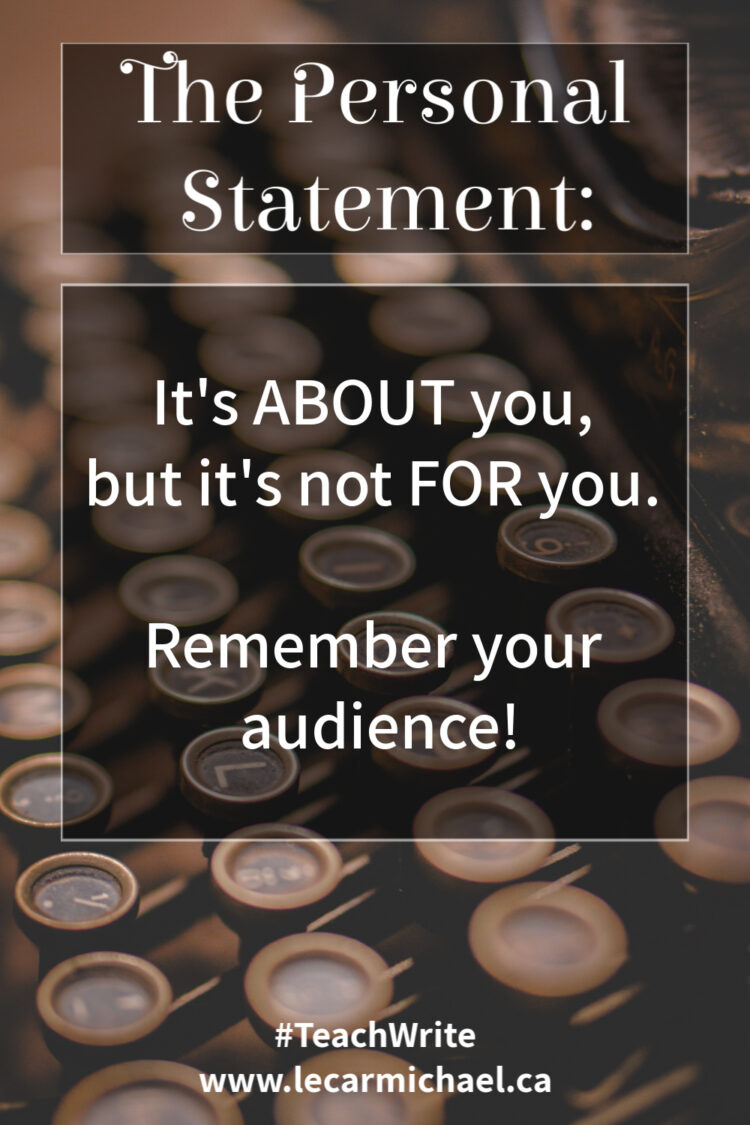 Welcome to Teach Write! This column draws on my 20 years’ experience teaching writing to kids, university students, and adult learners. It includes ideas and exercises that teachers and students can use in the classroom, and creative writers can use to level up their process.
Welcome to Teach Write! This column draws on my 20 years’ experience teaching writing to kids, university students, and adult learners. It includes ideas and exercises that teachers and students can use in the classroom, and creative writers can use to level up their process.
Personal statements and letters of intent… with the possible exception of the dissertation, there are no forms of academic writing quite as likely to turn an ordinary student into a quivering ball of overwhelming anxiety.
Deep breaths, all. I am here to help. First things first.
When will you be asked to write a personal statement or letter of intent?
For applications. Most often graduate school and scholarship/financial aid applications, but sometimes undergraduate university programs request them, too.
What’s the difference between a personal statement and a letter of intent?
For all practical purposes, not a thing! The terms are used interchangeably in identical contexts. And other than trying to keep it to one, single-spaced page, there are absolutely no rules about the structure or content of either of these documents. You can write them any way that is effective – which is to say, any way that achieves your purpose.
So what IS that purpose?
I’m so glad you asked me, because this is where is all tends to go pear-shaped.
These documents help us get into schools – or help get us the money we need to pay for our educations. As a result, they are high-stakes pieces of writing that can have lasting consequences for our lives. So it’s not surprising that we tend to fixate on OUR goals while writing them. And our goals are very simple:
- to get in, or
- to get the cash.
Because we are fixated on these, admittedly, very important goals, we tend to forget something really important: our audience.
Our personal statements are about us, but they are not for us. Which means that the real goal of a personal statement is not to, say, get us into graduate school. It’s to convince total strangers that they want to LET us into graduate school. And that shift in emphasis changes everything. Instead of thinking about how much we want the thing we are applying for, and how much is riding on our getting it, we have to start thinking about what someone else needs to know about us to feel comfortable investing limited resources in us. As opposed to investing in the many other, perhaps equally qualified, people who are vying for the same spot or scholarship.
We will return to these most difficult of documents in future columns (probably many times) but for now, consider the following:
- How do I show that I am qualified to do this?
- What past experiences and accomplishments have prepared me for the next step?
- What do I want to do next, and why?
- How do I show that I am capable of achieving the things I want to achieve?
Brainstorm until you’re confident you can answer all of these questions before you start to write.
Hey, did you know I teach writing workshops? It’s true – I work with adult writers, teachers, and students of all ages. Contact me to learn more.